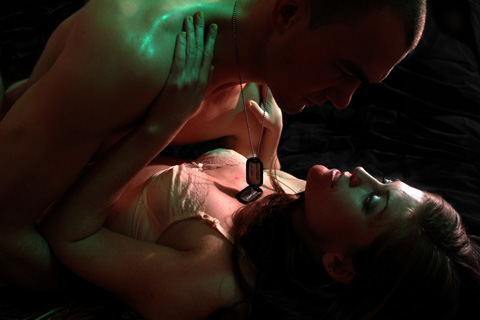
READY FOR ADVENTURE? Erin Markey and Alan Brincks are playing Tennessee Williams’s long-lost Green Eyes in a bedroom at the Ames Hotel. |
Forget the Hotel California; welcome to the Hotel Tennessee. Company One has checked into the Ames Hotel(through February 12) with New York–based the Kindness's production of Green Eyes, a recently discovered one-act written around 1970 by Tennessee Williams. The 45-minute piece, which depicts a rough-and-tumble morning after a fraught if fuzzy wedding night in a New Orleans French Quarter Hotel, is being played in a third-floor bedroom of the chic hostelry before audiences of 25 people who are so close to the action they can smell the orange juice. They are also in such proximity to the mesmeric Erin Markey — sexual smoke curling as languidly about her as if she were a lit cigarette — that they may start glancing about for a fire extinguisher.This startlingly intimate, site-specific production, which opened last year at Manhattan's Hudson Hotel, may be a genuine arts event or it may be little more than an excuse for voyeurism. But it is an adventure — one that left me thinking that if Company One sprang for a suite they could give us an eyebrow-singing staging of Cat on a Hot Tin Roof with the audience moving back and forth between the bedroom and Big Daddy's birthday party.
Green Eyes is, to put it mildly, a lesser work — one that languished unpublished for almost 40 years. But it does reveal a less self-censoring allegorist than the author of the major plays, exploring more candidly connections between sex and violence, femininity and rapaciousness.
In Markey's Southern-steamed portrayal, the newly wed Mrs. Claude Dunphy welcomes us to her honeymoon, then sheds her panty girdle and dives into bed. When Mr. Dunphy (a threatening Alan Brincks) joins her, he is not a happy man. It seems he spent the night drinking on Bourbon Street, only to stagger home and find his bare-breasted bride a mass of "tooth and claw marks" and a used condom in his toilet. This exacerbates the mid-traumatic shock he's experiencing on leave from a Vietnam-like conflict in the fictional "Waakow."
In Travis Chamberlain's smack-down of a staging, its war and jungle metaphors underlined by a black-velvet tiger above the bed and a sound design that suggests battle flashbacks, the psychosexual tension escalates until Mrs. D. triggers a purgation, exultantly delivering a confession that may be real, her fantasy, or even a shared fantasy à la Pinter's The Lover. But the truth is not the thing — nor is the play. It's the flirtation with mayhem and the claustrophobic witnessing that are the elephants in this room.
Sugar rush
Down the street from where Robbie McCauley was a girl in Georgia, there was a patch of sugar cane. In her one-woman show, Sugar (presented by ArtsEmerson in the Paramount Black Box through January 29), the Obie-winning playwright-performer and Emerson professor links that sweet plant to both slavery in the Caribbean and her own lifelong battle with diabetes. Like love, she purrs, sugar "is complicated." McCauley's early memories, from sucking on the cane to "cakes so good they made you want to slap somebody," are deliciously evocative. But for her, as for a disproportionate number of African-Americans, sugar has been a burden — as she illustrates at one point by carrying a tall, heavy bundle of cane on her back.